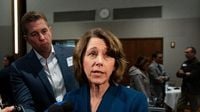Wisconsin voters have made a significant choice in the state Supreme Court election, opting for liberal candidate Susan Crawford over her conservative opponent, Brad Schimel, in a race that has been described as a referendum on the influence of national figures like former President Donald Trump and billionaire Elon Musk. The election, held on April 1, 2025, has been marked as the most expensive state Supreme Court race in U.S. history, with nearly $100 million spent on campaigning.
Crawford's victory preserves the court's 4-3 liberal majority, a crucial outcome given the high-stakes issues that the court may soon tackle, including abortion rights, union regulations, and congressional redistricting. With 71% of the votes counted, Crawford was leading with 55.7% of the vote compared to Schimel's 44.3%. Following the results, Schimel conceded, stating, "I knew I had to put my all in, but you gotta accept the results."
The election drew national attention not only for its implications but also for the substantial financial backing from Musk and political groups associated with him, which reportedly spent over $21 million to support Schimel's campaign. Musk's involvement included a controversial rally where he gave away two $1 million checks to incentivize voter turnout. At the rally, he urged supporters to mobilize, emphasizing the race's importance for the future of civilization.
As the first major battleground state election of Trump’s second term, the contest became a focal point for both parties. Democrats rallied behind Crawford, leveraging Musk’s financial influence as a campaign theme. The Democratic Party of Wisconsin even launched a town-hall tour titled "People v. Musk," aiming to highlight his perceived attempt to buy the election.
Crawford, a Dane County circuit judge, expressed her determination to fight for justice against powerful interests. "As a little girl growing up in Chippewa Falls, I never could have imagined that I’d be taking on the richest man in the world for justice in Wisconsin," she told supporters on election night. Her campaign was bolstered by endorsements from prominent figures, including former President Barack Obama.
The spending in this election was unprecedented, with the Brennan Center for Justice reporting that nearly $100 million was spent by candidates, state parties, and outside groups. Approximately $53.3 million was spent supporting Schimel, while nearly $45.2 million went toward Crawford. This staggering financial commitment underscores the election's significance not just for Wisconsin, but for national political dynamics.
Crawford's win means that the liberal majority on the court will remain intact at least until 2028. This majority is particularly significant as it prepares to hear cases on contentious issues such as the state's 1849 abortion ban and collective bargaining rights for public workers. The court had previously heard a challenge to the abortion ban and is widely expected to overturn it, marking a pivotal moment for reproductive rights in Wisconsin.
In addition to the Supreme Court race, Wisconsin voters also approved a constitutional amendment to enshrine a voter ID law, a measure that conservatives hope will strengthen election security. Trump celebrated this amendment, framing it as a significant victory for Republicans.
The results from this election are viewed as a setback for Trump and Musk, who had hoped to influence the court's direction through Schimel's candidacy. Trump's endorsement of Schimel in the final days of the campaign aimed to galvanize conservative turnout, but ultimately, the election results indicate a rejection of their combined influence.
Political analysts suggest that this election could serve as a blueprint for future campaigns, particularly as Democrats look to replicate the anti-Musk strategy in other races. The outcome reflects a broader trend of voters responding to perceived overreach by wealthy individuals in political contests.
As Wisconsin continues to be a battleground for political ideologies, the implications of this election will likely resonate beyond state lines. With state Supreme Court elections scheduled annually through 2030, the political landscape is set for ongoing contention.
In summary, Susan Crawford's victory in the Wisconsin Supreme Court election represents a crucial moment for the state's judicial future and a significant political statement against the influence of national figures like Trump and Musk. As the court prepares to tackle pressing issues, the stakes remain high for both sides of the political spectrum.








